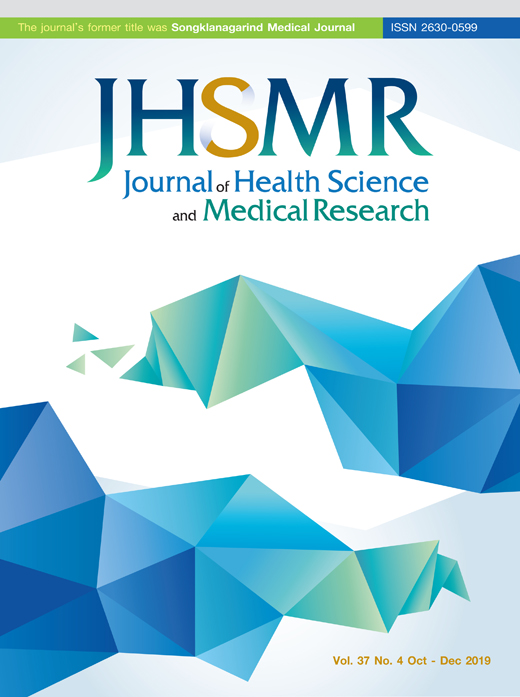Outpatient and Caregiver Understanding of Auxiliary Instructions on Medication Labels at Ongkharak Hospital, Nakhon Nayok
DOI:
https://doi.org/10.31584/jhsmr.201960Keywords:
auxiliary instruction, Ibuprofen, medication label, Ongkharak Hospital, understandingAbstract
Objective: To investigate the understanding of common auxiliary instructions among outpatients and caregivers at Ongkharak Hospital, Nakhon Nayok, Thailand.
Material and Methods: This cross-sectional descriptive study was conducted from March to April 2017 at Ongkharak Hospital. The convenience sampling subjects were directly interviewed in order to assess their understanding of auxiliary instructions on five medication labels: Ibuprofen, Amoxicillin, Cetirizine, Ferrous fumarate and Insulin.
Results: Three hundred and eighty-five subjects participated in this study (212 patients and 173 caregivers). Most were female (66.0%) with an average age of 48.95±17.02 years, secondary school graduates (44.7%), and employees (29.6%). Concerning their experience, most of them (>90.0%) had seen and read the auxiliary instructions. All of the instructions were explicit. Pharmacists explained the instructions to them. Most of them received the auxiliary instructions of Ibuprofen, Amoxicillin and Cetirizine. Concerning their understanding of auxiliary instructions, they correctly understood the indication of Ibuprofen (62.3%), Cetirizine (58.4%), Ferrous fumarate (19.2%) and Amoxicillin (12.5%). They could comprehend how to administer Insulin (78.2%), Ibuprofen (74.8%) and Amoxicillin (61.3%). A few of them truly interpreted the side effects of Cetirizine (9.4%), Ferrous fumarate (8.8%) and Insulin storage (4.9%).
Conclusion: Some of the auxiliary instructions used at Ongkharak Hospital should be revised in order to be more concise and pertinent. Moreover, pharmacists should explain auxiliary labels every time to enhance outpatient and caregiver understanding of medication uses.
References
2. Chayakul Ch, Chongtrakul P, Wananukul W, Punnupurot P, Karnchanarut P, Yodsombut K, et al. Rational drug use hospital manual. Bangkok: The Agricultural Coorperative Federation of Thailand Limited; 2015.
3. Piyasin K, Burat N, Muangkhao P, Prasertsang P, Lertsinudom S. Understanding on auxiliary labeling of outpatient at
Khon Kaen Hospital. Isan J Pharm Sci 2014;9(Suppl):S88-92.
4. Alburikan KA, AbuAlreesh A, Alenazi M, Albabtain H, Alqouzi M, Alawaji M, et al. Patients’ understanding of prescription drug label instructions in developing nations: the case of Saudi Arabia. Res Social Adm Pharm 2018;14:413-7.
5. Mongkolchaipak J, Raumsuk J, Chaiprateep E. The study of customer’s knowledge and behavior in using antibiotic at community drug store in Pathum Thani province. EAU Herritage J 2012;6:91-100.
6. Davis TC, Wolf MS, Bass PF, Thompson JA, Tilson HH, Neuberger M, et al. Literacy and misunderstanding prescription drug labels. Ann Intern Med 2006;145:887-94.
7. Angsuwattanakul B, Lertkiatbundit S. Development of pictorial labels for illiterate patients part 1: instructions on how to take tablets. Thai J Pharmacy Pract 2014;6:41-60.
8. Angsuwattanakul B, Lertkiatbundit S. Development of pictorial labels for illiterate patients part 2: advice on drug uses. Thai J Pharmacy Pract 2014;6:61-74.
9. Jittsue A, Sangjam P, Treesak C, Hanlerdrit T. Assessment of knowledge and practice of patients before and after counseiling in the use of the reusable insulin pen at Vachiraphuket Hospital. Songkla Med J 2016;34:27-37.
10. Karakes V, Pragodpol P. The effects of medication injection teaching by using GPS insulin’s innovation on fasting plasma glucose in diabetes patients who treated with insulin injection. J Nursing Health Care 2017;35:145-54.
























